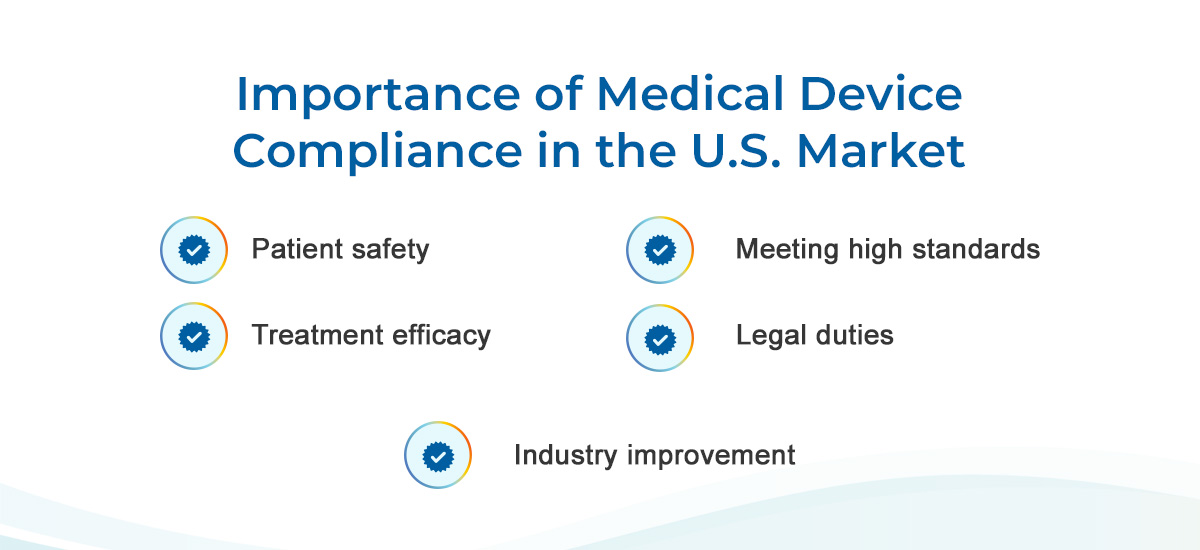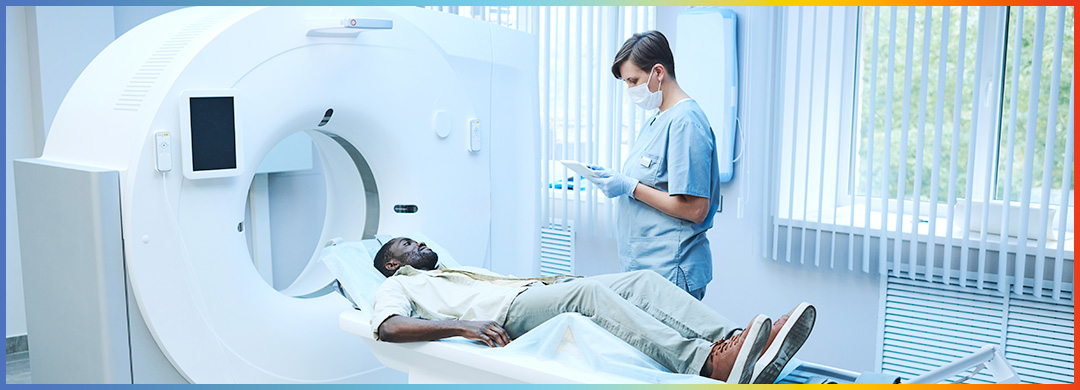Medical devices are highly regulated in the United States. Since U.S. regulatory compliance for MedTech is stringent and continuously changing, staying up-to-date on the latest standards helps businesses avoid costly violations and improve the efficacy and safety of their products. Understanding these legal requirements and standards is essential for successfully bringing your products to market as a medical device company.
Table of Contents
Overview of U.S. Medical Device Regulations
The Food and Drug Administration (FDA) is the authority for medical device regulation in the United States. Under the FDA, the Center for Devices and Radiological Health creates specific standards for medical devices and radiation-emitting products.
In 1976, the Medical Device Amendments to the Federal Food, Drug and Cosmetics Act outlined a classification system for medical devices that is still in use today:
- Class I: This category includes devices with the lowest risk to human health. Examples include oxygen masks, arm slings and hospital beds.
- Class II: The second class of devices have a moderate risk to patient health and require special controls. These include catheters, syringes and blood pressure cuffs.
- Class III: The final category is the most stringent, as these devices have a high risk to human health if used improperly. They require premarket approval to ensure patient safety. Examples include cochlear implants, defibrillators and pacemakers.
All medical devices approved by the FDA fall into one of these categories and are subject to the Medical Device Reporting regulation. This law requires device users, manufacturers and importers to report adverse events, specifically if a device causes or contributes to serious injury or death.
Importance of Medical Device Compliance in the U.S. Market
Complying with regulations is crucial for medical device companies for many reasons, including:
- Patient safety: Most importantly, medical device compliance aims to ensure patient safety. These devices are used in various medical applications, from complicated surgeries to minor testing. If a device fails to meet regulatory standards, it can impose serious health risks, including injury and death. Strict regulations help ensure patients are safe from serious harm.
- Treatment efficacy: Another key reason medical devices must meet the U.S. compliance standards is to ensure the device is effective, accurate and reliable in diagnosing or treating patient conditions. Medical devices that do not meet regulations may negatively impact the quality of care provided to individuals.
- Meeting high standards: The medical industry must uphold high standards to maintain patient trust and reliance. Patients must be able to put their faith in health care providers, feeling confident that the tools and devices utilized in their treatment and diagnosis are safe and effective and will not cause further harm.
- Legal duties: Medical device compliance is also essential for meeting strict legal obligations. Failing to meet all applicable regulations can result in fines, criminal cases and other serious legal consequences.
- Industry improvement: Medical device compliance standards are constantly evolving, helping drive continuous improvement in the health care industry. Ongoing device advancement enhances the quality and effectiveness of these tools to ultimately support better patient outcomes.

Medical Device Regulatory Compliance Issues in the U.S.
Staying up-to-date and navigating medical device regulations in the United States can be difficult for businesses, especially smaller organizations. Explore some of the top challenges below:
Regulatory Complexity
Medical device regulations can be highly complex, and interpreting them correctly can be a hurdle for your business. Ambiguous language and inconsistent interpretations can leave you feeling unsure about the standards your device must meet. Additionally, understanding complicated documentation requirements can also be difficult.
Changing Compliance Standards
Another common issue for medical device businesses is staying up-to-date on continuously changing regulations. The FDA updates its standards to enhance device safety and effectiveness. Ensuring your company meets these ever-evolving regulations can be a headache without proper systems for support.
Limited Resources
Medical device companies must have adequate resources to continuously update their products to meet changing compliance standards. For smaller businesses or those just starting, having enough personnel and money to continually update their devices can be a huge roadblock.
Cybersecurity and Data Risks
The American health care sector is a huge target for cybercriminals aiming to access private information and data. Medical device companies must understand current cybersecurity risks and their responsibilities.
Businesses must comply with Section 3305 of the Consolidated Appropriations Act, which outlines criteria for ensuring a strong cybersecurity posture for medical devices. It includes guidance for the following when preparing premarket submissions for medical devices that may pose a cybersecurity risk:
- Device design
- Labeling
- Documentation
Role and Benefits of Medical Device RIMS Platforms in the U.S.
A regulatory information management system (RIMS) is one of the most advantageous tools for medical device businesses looking to sell their products in the United States.
RIM solutions provide the following features and benefits to streamline compliance, ensuring your medical devices meet all applicable standards and adhere to the latest regulation updates:
- Centralized data management: A RIMS provides businesses with all the regulatory data and information they need, including documentation, submissions and requirements, in a single system. They effectively streamline regulatory processes and offer greater visibility into changing rules.
- Enhanced tracking and monitoring: A huge advantage of using a RIMS is ensuring your medical devices meet regulatory requirements at any given time. These systems update regularly to ensure you are aligning products with the latest regulations.
- Streamlined submission management: RIM platforms also make preparing and submitting regulatory documents, such as premarket notification and investigative device exemptions, to the U.S. FDA seamless.
- Automated workflows: RIM solutions equipped with advanced technologies like artificial intelligence can supercharge compliance processes by automating repetitive workflows, such as document review, approval and reporting. They save your business valuable time and energy while reducing the risk of inaccuracies and errors.
- Detailed audit trails and documentation: Another key benefit of having a RIMS is maintaining the most up-to-date audit trails of your business’s most important regulatory activities, assuring you have a detailed record of all compliance initiatives to share with the FDA if needed.
Request a Demo of the RIM Solutions From RegDesk Today
If your medical device business wants to streamline compliance in the United States and globally, turn to RegDesk’s regulatory information management system. Our platform gives you a holistic approach to compliance, going beyond tracking and managing registration.
You’ll get the most comprehensive, up-to-date regulatory insights in a centralized solution that supports optimal efficiency and accuracy. Our RIM software also enables you to leverage the power of AI to prepare, manage and publish submissions worldwide.
Request a demo of the RIM solutions from RegDesk and see our system in action today.


